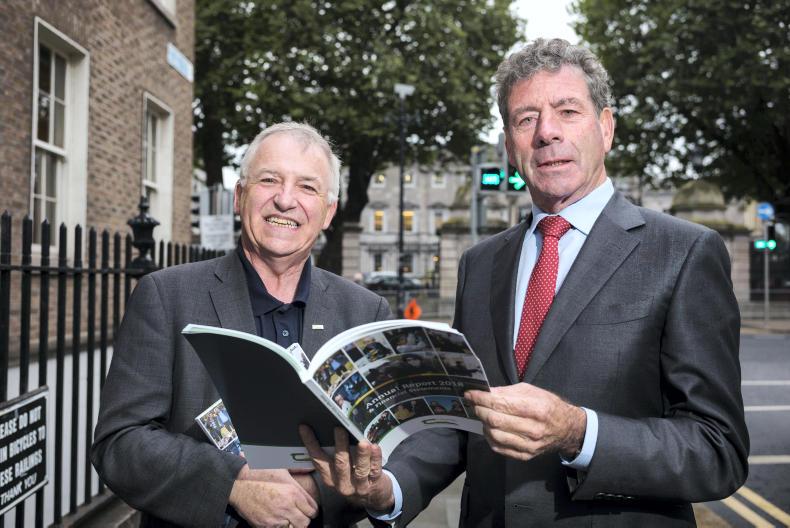Teagasc, the semi-state body responsible for research and development, training and advisory services in the agri-food sector, has published its annual report. Teagasc serves almost 43,000 farmer clients with 240 advisers across Ireland.
Excluding funding pensions, Teagasc income for the 2018 financial year was €195m – up €8m on the previous year. The Irish Government put in €149m last year, €7m more than in 2017. The EU contributed €2.1m – similar to the previous year. Most of this was under the Horizon 2020 programme which supports research and development activities. Teagasc received €3.7m from the State under the knowledge transfer programme – down from €4.1m the previous year.
Research income increased by 6.3% to €15.9m, including increases of €1.8m in externally funded research grants, €481,000 in analysis fees and €523,000 in other research income and a reduction of €988,000 in livestock trading income.
Knowledge Transfer income fell by 13% to €16.9m, with a drop of €1.6m in advisory services income and €1.6m in course fee/student fee income. Science Foundation Ireland provided a grant of €3.7m, while Enterprise Ireland provided a grant of €2.7m.
Proceeds of €488,000 were secured in 2018 for sales of assets and there was additional one-off capital funding of €1.9m for the development of Johnstown Castle and for the purchase of a parcel of farmland.
Expenditure
Total expenditure at Teagasc amounted to €186.6m last year – up 4% on the previous year. This included €40.6m for retirement benefits. Wages and salaries are the largest single item, amounting to €75.3m. During the year Teagasc employed 1,230 people. The majority or 743 of these were in professional services, with 156 technical people. In total, 453 of these earned in excess of €60,000, with 55 people earning more than €100,000.
Travel and subsistence amounted to €5.6m. Walsh Fellowship grants came to €6.3m. Last year, Teagasc spent €2.2m on consultants, which included legal advice, research advice and engineering advice.
Teagasc provides support to three private Agricultural colleges – Gurteen, Mountbellew, and Pallaskenry. Last year, it gave grants of €2.9m along with the cost of staff seconded to the colleges of €685,000.
Overall, Teagasc made an operating surplus of €5.6m – up 11% on the previous year. Teagasc held €506,000 in quoted shares at the year end. These included shares valued at €461,000 in Glanbia and €45,000 in Kerry Group.
Last year, the Department of Agriculture, Food and the Marine, through Teagasc, invested €6.5m in the National Prepared Consumer Foods Centre at the Teagasc Food Research Centre in Ashtown, Dublin. The investment was in equipment and infrastructure to develop a shared research capability in order to address the low levels of research and development in the prepared consumer foods sector.
Climate change is one of the biggest challenges facing us all
Also last year over €2.1m was invested in horticulture facilities at Teagasc Ashtown, including a modern glasshouse equipped with advanced systems for research, a turf grass academy, a horticultural utility building, a large multi-span forestry polytunnel and additional polytunnels. A mushroom research unit which has 100m2 of growing area to support a dedicated mushroom research programme was also established.
Speaking at the publication, chair of Teagasc Liam Herlihy said: “Climate change is one of the biggest challenges facing us all. In 2018, Teagasc produced a major report titled Analysis of Abatement Potential of Greenhouse Gas Emissions in Irish Agriculture 2021-2030, which identified measures that can be adopted by farmers to reduce the emissions from farming. Many of these measures have subsequently been included in the Government action plan on climate change which was published earlier this year. Teagasc is intensifying its Knowledge Transfer activities with farmers to improve the adoption of these measures, so agriculture is playing its part in addressing the challenge of reducing GHG emissions.”
Difficult year
Teagasc director Prof Gerry Boyle said: “2018 was a difficult year for the farming sector due to weather-related difficulties in the winter, spring and summer. The uncertainty created by Brexit has already impacted on the agriculture sector through a weakening of the sterling exchange rate with the euro. Further Brexit-related challenges face the sector. Teagasc has made a number of important investments to help the agriculture and food industry prepare for, and adapt to, the challenges ahead.”






 This is a subscriber-only article
This is a subscriber-only article









SHARING OPTIONS: